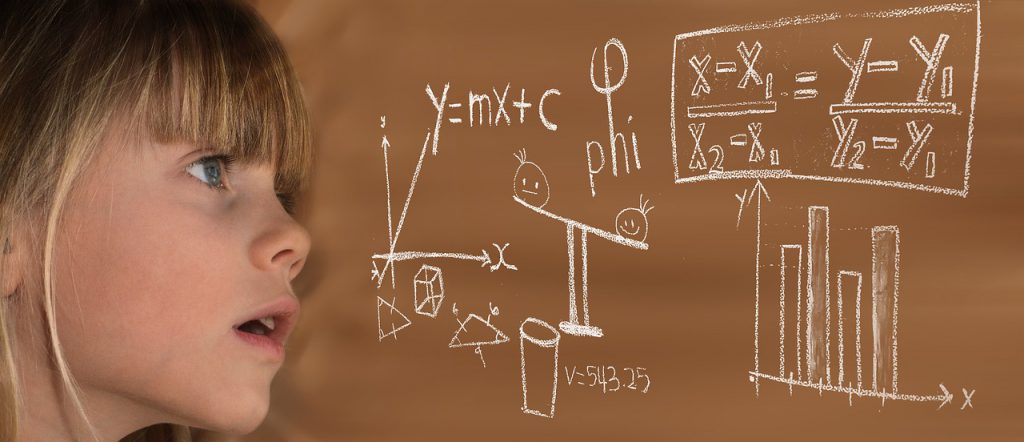What do you think about when you think about math? Most likely, the image of a calculator begins to form in your mind. This is no coincidence: the calculator was created by mathematicians in order to help them compute long, tedious, and difficult algebraic equations or formulas. These systems are called Computer Algebra Systems (CAS).

Today, calculators are much more than tools used exclusively by genius mathematicians and scientists. Indeed, few people can make it through the educational system without using one, and this fact is especially true regarding our children. Finding its origins in the early 1990s, the calculator controversy began to spread across the nation. All at once, students were saying goodbye to the by-hand symbolic manipulation procedures that had previously dominated school mathematics instruction for countless decades. Some scholars at the time, including the widely-published M. Kathleen Heid and Michael Todd Edwards, argued that hand-held calculators provided classrooms with a richer approach to mathematics.1 However, there were those who held that calculators could damage, rather than improve, general education. Edward M. Gray, for example, argued that focusing on the many different cumulative strategic methods of mental math is more important to nurture than simple calculation. He was wary of the widespread implementation of calculators, as he believed that they had the power to sway the attention and subsequently cause a fall in performance.2 In addition to these viewpoints, the topic of disabled accommodation was also a common point of academic contention. The few studies done by other scholars seemed to point to technology as an aiding tool for those with learning disabilities and found that they generally equalized the academic standard of the classroom. Before long, however, the arguments in favor of calculators faded as it became clear that the implementation of the mathematics tools in classrooms began to cause children to have a less conceptual understanding of mathematics.3
The best way to organize this debacle is to look at why the calculator was implemented into general education in the first place. The CAS systems are also known as symbolic manipulators. Since the early 1980s, symbolic manipulation programs, or computer-based mathematics packages that perform exact arithmetic and symbolic algebra calculations, have been available for use by secondary mathematics teachers and students. The introduction of these systems into general education was originally seen as an open door to a possible shift from the emphasis on the traditional means of solution to a more nuanced and conceptual understanding of real-life aspects. Instead of wasting time by attempting problems that were near impossible to do on paper, one could now reach the same conclusion in a clear cut and understood manner in a matter of seconds. Shocked by their potential, scholars like Heid and Edwards believed that these systems could help bring about the creation of a richer approach to mathematics.4 Having access to classroom-available technological power, they claimed, enabled teachers to provide students with a whole new approach to mathematics and more solution-based classes, such as algebra. With the addition of the calculator to the classroom, students could hypothetically use symbolic manipulation, sense, and disposition all to reach an accurate conclusion. The process of learning mathematics would become one of paper and computer and could end with a better understanding of the underlying concepts of the subject. Defenders of calculators in classrooms would also point to the fact that the CAS keeps getting better and more advanced with each passing year as a reason to keep them in the hands of children. Pairing these powerful machines with conceptual learning, they argued, becomes increasingly important as society continues to advance, and children need to learn and adapt to the changes in the real world. Heid and Edwards acknowledged that this technology had the ability to change the way math was taught, and they believed that the CAS represented nothing more than an enrichment to the already existing curriculum.5

In addressing this line of reasoning, Edward Gray argues that the main focus should be on the conceptual understanding of mathematics alone. In his eyes, the calculator isn’t needed unless one finds oneself attempting to solve a near-impossible question. Branching off of this idea, Gray went on to argue that the focus on “learning how to solve” is being disregarded entirely by the widespread use of calculators. In constructing his argument, Gray gave many examples of how the average student from ages 7 to 12+ computes arithmetic. In his study, he found that the main methods of problem-solving were count-all, count-on, and known/derived facts. The use of cumulative strategies to solve almost any combination of addition, subtraction, multiplication, and division, was common throughout the classroom and observed in every student.6 Teaching students to use already understood concepts, Gray claimed, proved to be the most impactful method for their education. It was clear that those who used the methods listed above had higher performance rates than those who didn’t. It was also clear that not many students knew how to use derived facts, which is basically knowing to call back to past information. This is clearly a problem that needs to be addressed head-on before we even think of touching a calculator. While graphic calculators may nurture the problem-product linkages, the arena for further consideration must focus more sharply on the different types of thought that are brought to bear on mathematical activity by the able and the less able alike.7
Our dependence on calculators is made eerily clear by a popular study done by Bridgeman, Harvey, and Braswell. The study consisted of about a hundred college-bound juniors and had multiple levels of testing. Out of the total students, over 60% stated that they used a calculator almost every day, with only one student claiming to never make use of a calculator! The question remains, however: does the use of the calculator actually have any bearing on our abilities? The study attempts to answer this important query by testing students to find their average SAT-M test scores. After acquiring the scores, they then compared their results with the official results from College Board for college-bound seniors in 1991.8

This collection of data would represent the control or the base data that the researchers would utilize. After finding the control, they began adding stipulations to the test and subsequently observed how their actions affected the scores. They found that the use of calculators resulted in a modest score increase on a test composed of the type of mathematical reasoning found on the SAT, although effects on individual items ranged from positive through neutral to negative. The test also consisted of many different ethnicities and backgrounds, which caused the data to be a bit more skewed and less reliable as an overall conclusion. From the base data, the addition of calculators did not seem to drastically influence the overall scores of the experimental group of students. Instead, they were merely proven effective on conceptual problems by turning them into simple calculation routines and by benefiting low-scoring students. However, the removal of calculators altogether would actually benefit the high-scoring students. Thus, the study ultimately proved that it is impossible to make generalizing statements such as “calculators always improve scores,” because every student has a different level of understanding.9
Despite the presence of controversy that surrounds them, calculators will remain useful tools that can sometimes aid those with less conceptual understanding of mathematics. Many people are born with learning disabilities that cause math to be extremely difficult to understand. With that in mind, it shouldn’t be easy to say that learning math should be based on conceptual understanding and connections with derived knowledge. Attention to calculator use and students with disabilities is necessary as a combined result of the general controversy of calculator use in mathematics education, the lack of evidence-based value on calculators for modern society, and the specific controversy regarding calculators for students with disabilities. The largest of these controversies has to do with the underlying idea of fairness. Many parents think that it would be unfair to limit calculator use to special accommodations for disabled students because they believe that it will give them a supposed advantage. The use of calculators by students with disabilities for computation, however, has been likened to common tools to assist students with other types of disabilities. You would never deny a physically disabled child mobile technology, so the idea that giving children with learning disabilities calculators is unfair is simply discriminatory in nature.10 Nevertheless, to prove these allegations wrong, three scholars, Emily C. Bouck, Gauri S. Joshi, and Linley Johnson, conducted a test to see the difference in calculator use among students with and without disabilities. The test they set up involved 146 sixth-graders and 149 seventh-graders, of which about 17% had learning disabilities. The children were given both a multiple-choice and an open-ended exam. At the end of the test, students self-reported using calculators more often on multiple-choice rather than open-ended problem-solving assessments across the board, with the exception of sixth-grade students without disabilities, who received traditional curriculum materials. Students without disabilities self-reported using a calculator more frequently on both types of assessments as compared to students with disabilities. The data from this study found that students with disabilities answered more questions correctly when they used a calculator, and went on to prove that they were more likely to answer questions correctly when using this tool. This observation was also true for students without disabilities.11
The controversy of calculator use in pre-college math has been rampant since the first mention of the computer systems. As a result, there have been countless studies on the effectiveness of calculators and how they affect our overall understanding of mathematics. Although the idea of widespread calculator use is steeped in subjectivity, it must be affirmed that mental math is enhanced by knowledge of how to use calculators correctly. The calculator is supposed to encourage learning by bettering one’s general understanding of mathematical concepts—It makes concepts that are difficult to understand easier and quicker to learn. Regardless of one’s stance on the matter, each side agrees that mental math is a very important and crucial subject to learn as a young child. Without mental math, basic mathematics is very difficult and the child may even suffer in the long run. Calculators may be given out as accommodation for those with disabilities, but because they have an innate tendency to discourage the memorization of basic mathematical theory, they should be left out of the required supplies for the remainder of students. As evident in the study by Bridgeman, Harvey, and Braswell, the use of a calculator barely changed the overall scores of a variety of children in different grade levels. In fact, it may have made conceptual problems harder to solve because of common calculator errors. The best way to integrate calculators is to only include them in high schools so that prior knowledge is gained before students are given access to the tools. Looking through multiple studies, it is clear that calculators are not to blame. The educational system needs to regain its curriculum and use calculators as tools and not as crutches. Calculators are not the death of learning today, but they could become it if this blatant misuse continues.12
- M. Kathleen Heid and Michael Todd Edwards, “Computer Algebra Systems: Revolution of Retrofit for Today’s Mathematics Classrooms?,” Theory Into Practice 40, no. 2 (2001): 128-129. ↵
- Edward M. Gray, “An Analysis of Diverging Approaches to Simple Arithmetic: Preference and Its Consequences,” Educational Studies in Mathematics 22, no. 6 (1991): 572-573. ↵
- Emily C. Bouck, Guari S. Joshi, and Linley Johnson, “Examining calculator use among students with and without disabilities educated with different mathematical curricula,” Educational Studies in Mathematics 83, no. 3 (2013): 382-383. ↵
- M. Kathleen Heid and Michael Todd Edwards, “Computer Algebra Systems: Revolution of Retrofit for Today’s Mathematics Classrooms?,” Theory Into Practice 40, no. 2 (2001): 128-129. ↵
- M. Kathleen Heid and Michael Todd Edwards, “Computer Algebra Systems: Revolution of Retrofit for Today’s Mathematics Classrooms?,” Theory Into Practice 40, no. 2 (2001): 132-134. ↵
- Edward M. Gray, “An Analysis of Diverging Approaches to Simple Arithmetic: Preference and Its Consequences,” Educational Studies in Mathematics 22, no. 6 (1991): 567-569. ↵
- Edward M. Gray, “An Analysis of Diverging Approaches to Simple Arithmetic: Preference and Its Consequences,” Educational Studies in Mathematics 22, no. 6 (1991): 572-573. ↵
- Brent Bridgeman, Anne Harvey, and James Braswell, “Effects of Calculator Use on Scores on a Test of Mathematical Reasoning,” Journal of Educational Measurement 32, no. 4 (1995): 328-329. ↵
- Brent Bridgeman, Anne Harvey, and James Braswell, “Effects of Calculator Use on Scores on a Test of Mathematical Reasoning,” Journal of Educational Measurement 32, no. 4 (1995): 339. ↵
- Emily C. Bouck, Guari S. Joshi, and Linley Johnson, “Examining calculator use among students with and without disabilities educated with different mathematical curricula,” Educational Studies in Mathematics 83, no. 3 (2013): 370-371. ↵
- Emily C. Bouck, Guari S. Joshi, and Linley Johnson, “Examining calculator use among students with and without disabilities educated with different mathematical curricula,” Educational Studies in Mathematics 83, no. 3 (2013): 381-382. ↵
- Brent Bridgeman, Anne Harvey, and James Braswell, “Effects of Calculator Use on Scores on a Test of Mathematical Reasoning,” Journal of Educational Measurement 32, no. 4 (1995): 330-331. ↵




41 comments
Amanda Quiroz
I can do math but that is only I have a calculator. I cannot imagine doing it without one. I would be helplessly lost. Regarding the argument between calculators being beneficial, I was always taught that calculators are only beneficial if you know what you are using them for. In other words, the calculator is not entirely doing all of the thinking for you.
Thalia Romo
I enjoyed reading this article because it allowed me to learn new information about the effect that calculators had on the understanding of mathematics. Since I’ve practically grown up with calculators throughout my life, it would be a strange idea to think of them not existing. I agree with the point the author makes when they say, “every student has a different level of understanding” when speaking about making general statements about improved tests scores. I don’t think calculators should be removed from classrooms, rather the basic methods of math should be taught first and allow children the ability to gain an honest understanding of the subject.
Azucena Cuevas
I personally love Math and I think it is really important to teach children not to depend on calculators. However, I have always been dependent on calculators and even catch myself using a calculator for a simple math problem. Providing a calculator can be beneficial to those who need extra help, but teachers should limit the usage on them to decrease this issue.
Ashley Martinez
I never have really been a big fan of math, but I really enjoyed reading about this article. This was a great article filled with great information. This article was very attention grabbing and it really made you think about things. It is crazy to think how dependent we as a society have become on calculators. I know that personally I rely greatly on calculators for my math. The use of a calculator has really caused our math skills to decline. I think it is important to be able to know how to do math with a pencil and paper opposed to the calculator. But the calculator is so convenient to have. Great Job Sabrina!
Cassandra Sanchez
Until recently, math has always been a difficult subject for me and it is really hard to imagine the subject without the use of calculators. I never knew that there was a debate over if calculators were beneficial or harmful to the education system. I personally see them as beneficial because it saves time on hard problems but I can also understand the argument that it is damaging how we learn by doing the work for us. I think it is important for us to be able to do math without a calculator but in some cases they are necessary for us to use.
Jacqueline Mendez
I have never liked reading about math but let me tell you I really found this interesting! I especially liked the data table provided as I can use it to analyze the statements that you provided! Very good job Sabrina! I truly believe that without a calculator I’d be in big trouble in math class. The world I feel has become less intelligent by the use of calculators but at the same time, nobody is willing to do the calculations now.
Cynthia Perez
Calculators are truly amazing and it makes sense as to why people believe it makes a person’s mathematical skills less enhanced considering how calculators simply compute simple calculations in the palm of your hand. It genuinely takes a lot less effort using that when solving a problem and as efficient as it is it really makes us rely too heavily on them to where we would be lost without them. I like the whole concept of, technology is becoming so advanced things that were once difficult could be reduced to such easy work, but what will become of us?
Rahni Hingoranee
This article has a very unique topic being explored. I agree that the usage of the calculator has diminished the intellectual abilities of people greatly. However, I am guilty of using the calculator when I ought to be using my brain, often. It is true that we have become overly dependent on calculators as well as many other new technologies.
Margaret Maguire
This article was really neat. I never thought about the fact that by using calculators on a regular basis decreases our ability to do simple math because we don’t have to think super hard about solving simple multiplication or division problems. No one has to be really good at simple math if they don’t want to because of ease of access to a four function calculator. I really like math because of how something so complex can be solved in just a few steps. Calculators should be used mainly for solving trig functions.
Briley Perkins
This article was very interesting and very informative to read. I never knew of the explanation of where the calculator came from and how it was used. I thought it was interesting to read that not everyone agreed with the use of calculators while some did. I do somewhat agree with the fact that calculators now are used solely to find the answer and that we should not fully rely on it, because it won’t always be around for our use.